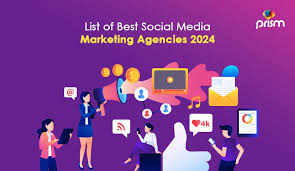Emerging Trends in Social Media Marketing for Agencies in 2025

Social media marketing continues to evolve rapidly, with new trends shaping the way brands connect with audiences. For agencies, staying ahead of these trends is vital to delivering impactful results for clients. As we step into 2025, here are the emerging trends in social media marketing that agencies must embrace to thrive in the ever-competitive digital landscape.
1. Rise of AI-Driven Social Media Tools
Artificial intelligence (AI) has become an integral part of social media marketing. From content creation to audience analysis, AI-driven tools are helping agencies enhance efficiency and precision. Platforms like ChatGPT and Jasper are being used to generate creative content, while AI analytics tools offer insights into user behavior and campaign performance.
By integrating AI into their strategies, agencies can automate routine tasks, personalize user experiences, and make data-driven decisions, giving them a competitive edge in 2025.
2. Short-form video Content Dominance
The popularity of short-form videos shows no signs of slowing down. Platforms like TikTok, Instagram Reels, and YouTube Shorts are at the forefront of this trend. Audiences prefer bite-sized, engaging content that they can consume quickly.
Agencies need to focus on creating high-quality, engaging video content tailored to specific platforms. Collaborating with influencers and leveraging trending challenges can further amplify reach and engagement.
3. Social Commerce Expansion
Social commerce is transforming the way consumers shop online. In 2025, platforms like Instagram, Facebook, and TikTok will enhance their in-app shopping features, enabling users to purchase products without leaving the app.
Agencies must prioritize seamless integration of e-commerce into social media campaigns. Optimizing product listings, utilizing shoppable posts, and creating immersive shopping experiences through AR (augmented reality) will be crucial.
4. Emphasis on User-Generated Content (UGC)
User-generated content continues to build trust and authenticity. Brands that feature content created by their customers can foster a sense of community and reliability.
Encouraging customers to share their experiences through hashtags, reviews, and photos is essential. Agencies should create campaigns that incentivize UGC, making it easier for users to participate and share their stories.
5. Integration of Augmented Reality (AR) and Virtual Reality (VR)
AR and VR technologies are becoming more accessible and integrated into social media platforms. Filters, virtual try-ons, and immersive experiences allow brands to engage users in innovative ways.
For instance, beauty brands can use AR for virtual makeup trials, while furniture companies can offer VR room planners. Agencies must explore these technologies to create unique, interactive experiences that capture attention.
6. Personalization at Scale
Consumers expect personalized content that speaks directly to their needs and preferences. Advances in AI and data analytics allow agencies to deliver highly targeted content at scale.
By analyzing user data, agencies can create segmented campaigns tailored to specific demographics, interests, and behaviors. Personalized email marketing, dynamic ads, and customized messages will drive better engagement and conversions.
7. Increased Focus on Sustainability and Social Responsibility
Consumers are becoming more conscious of brands’ values and ethics. Companies that demonstrate a commitment to sustainability and social responsibility resonate more with audiences.
Agencies should help clients align their messaging with their values. Highlighting eco-friendly practices, supporting charitable causes, and engaging in meaningful conversations about societal issues can strengthen brand loyalty.
8. Live Streaming and Real-Time Engagement
Live streaming is a powerful tool for real-time interaction. Platforms like Instagram Live, Facebook Live, and LinkedIn Live allow brands to connect with their audience directly and authentically.
Agencies can use live streams for product launches, Q&A sessions, behind-the-scenes looks, and collaborations with influencers. Planning engaging, interactive live content will be essential in 2025.
9. Voice Search and Audio Content Optimization
Voice search and audio-based content, such as podcasts and social audio rooms, are gaining traction. Smart devices like Alexa and Google Assistant are driving this shift.
Agencies need to optimize content for voice search by focusing on conversational keywords and creating audio content that aligns with their client’s brand identity. Podcasts and audio snippets can help brands build deeper connections with their audience.
10. Privacy and Ethical Marketing Practices
With increasing concerns about data privacy, agencies must adopt ethical marketing practices. Transparency about data usage and compliance with regulations like GDPR is non-negotiable.
Building trust through clear communication and respecting user privacy will be a significant trend in 2025. Agencies should also educate clients about the importance of ethical data practices to maintain credibility.
Conclusion
The landscape of social media marketing in 2025 will be defined by innovation, personalization, and authenticity. By leveraging AI tools, embracing emerging technologies, and prioritizing ethical practices, agencies can stay ahead of the curve. Focusing on trends like short-form video content, social commerce, and sustainability will help brands build meaningful connections with their audience.
Adapting to these emerging trends will enable agencies to deliver exceptional results for their clients, ensuring long-term success in the dynamic world of social media marketing. For expert guidance and tailored solutions, visit Prism Digital, a leading agency committed to driving impactful digital transformations.






